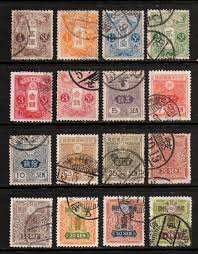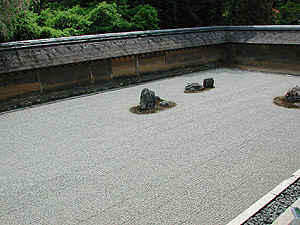itself disappeared
What is the secret of the Japanese rock garden
 The mystery of the disappearing fifteenth stone is, perhaps, the first thing the European has associated with the traditional Japanese “dry” garden. However, neither the “invisible” stone, nor “Mount Fuji”, nor the sea of moss are mandatory elements of a rock garden, unlike the person for whom it is intended – a person.
The mystery of the disappearing fifteenth stone is, perhaps, the first thing the European has associated with the traditional Japanese “dry” garden. However, neither the “invisible” stone, nor “Mount Fuji”, nor the sea of moss are mandatory elements of a rock garden, unlike the person for whom it is intended – a person.
How stone gardens appeared in Japan
The Japanese Garden has come a long way of development – from luxurious spaces designed to entertain the nobility and decorate the residences of aristocrats, to hidden meanings of secluded and quiet corners for meditation. Like all primordially Japanese, the traditions of creating gardens came to the islands Continue reading
Traditional japanese tea ceremony
 Japanese culture has given the world an ideal recipe for estranging from everyday worries and gaining a sense of peace and harmony with the world. A complex, symbolic tea ceremony is subject to fairly simple principles; they connect naturalness and sophistication, unpretentiousness and beauty. The “Way of Tea” – not eating, not gathering with friends – is a form of Buddhist meditation that arose about four centuries ago.
Japanese culture has given the world an ideal recipe for estranging from everyday worries and gaining a sense of peace and harmony with the world. A complex, symbolic tea ceremony is subject to fairly simple principles; they connect naturalness and sophistication, unpretentiousness and beauty. The “Way of Tea” – not eating, not gathering with friends – is a form of Buddhist meditation that arose about four centuries ago.
Ritual history
Like other traditional Japanese practices, the tea ceremony came to the islands of the Land of the Rising Sun from China. The drink itself has been familiar to the Japanese since the 7th century; it is believed Continue reading
JAPAN’S POSTAL MARKS
 Her Majesty Postage Stamp! It is a unique invention in itself. And she appeared at the behest of the time. Rather – at the behest of economic progress.
Her Majesty Postage Stamp! It is a unique invention in itself. And she appeared at the behest of the time. Rather – at the behest of economic progress.
The vigorously developing capitalism of the mid-19th century, industry, trade, transport, or, as they say now, “business”, needed a connection. Moreover, the communication is well-established, reliable, and, most importantly, publicly available, convenient and cheap. And this, I think, predetermined the fact that for the first time a postage stamp appeared in Great Britain, which had become by that time a powerful colonial power, a “workshop of the world”, a “world cab driver”, and a “world banker.” And the communication system that existed in the country at that time was cumbersome, expensive and required streamlining.
In 1837, a member of the House of Commons of the British Parliament, inventor and educator, Sir Rowland Hill published his project “Post Office Reform, its Importance and Feasibility”. In his work, he proposed to unify the postage Continue reading




